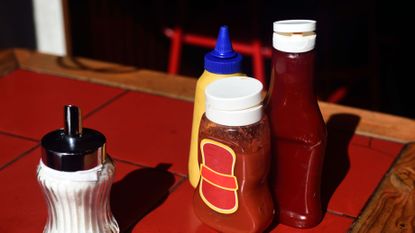

It’s Thanksgiving, which means you’re probably about to hear some terrible political opinions. As a refreshing palate-cleanser, every day this week the editors of Marie Claire will be sharing their most tightly-held unpopular opinions on a range of decidedly non-political subjects—in case you need something more interesting to fight about at dinner. See yesterday's here.
I don’t like condiments. No, not just "don't like"—I despise them. If it’s squeezable or spreadable, I’m not eating it. The way it wiggles. The way it oozes out when pressed between two burger buns.

The way it congeals in a slimy pool on a plate next to a pile of virgin fries. Condiments—ketchup, mayo, mustard, sour cream—are not only nasty and usually made from unnatural ingredients, but they also ruin the integrity of our food.
There are two questions I ask myself when it comes to my food accoutrement:
- Can it be used in a science class to explain how chemical reactions work?
- Can it be defined as neither a solid nor a liquid?
Let’s first approach question No. 1: If the food can be used as an explainer by Bill Nye the Science Guy, then it’s off my menu. These condiments are made up of ingredients that should not mix together by the properties of suspension and emulsion: Anything that involves an emulsion of egg yolk or a suspension of vinegar to exist, should not exist. They were not intended by nature to be together, but physics must have ‘effed up.
It's not me: It's chemistry, folks.

Oh HELL no.
Now on to question No. 2: If you’re in the gray area of viscosity, you don’t deserve a place on my plate. The texture of mayonnaise is just morally wrong, and you'll never convince me otherwise.
Stay In The Know
Marie Claire email subscribers get intel on fashion and beauty trends, hot-off-the-press celebrity news, and more. Sign up here.
The only caveat I have here may be salsa and guacamole, but I would argue that they are dips and do not fall under the aforementioned two rules.
I’m not saying your wrong to like condiments—I’m saying you’re wrong. And there are a lot of you out there who suffer from the same mysterious Stock-Heinz Syndrome. The U.S. consumes a whopping $2 billion worth of mayo every year, and the average American eats 71 pounds of ketchup annually. That’s more than 1 pound of ketchup a week. Even some of our biggest role models are not immune. NFL star Patrick Mahomes was recently offered a lifetime of free ketchup, which he professed to putting on his steaks. Steaks! I can't think of anything more sacrilegious, and yet this man is getting rewarded?
Don’t @ me, but people who say that condiments elevate the taste of their food clearly have unrefined palates. Condiments completely mask the taste of any food. Take, for example, a pristine crispy, hot French fry. Now imagine coating said fry in sticky, wet goo. Your fry, once golden and crunchy, has been demeaned to a sodden, sad, cold, and worthless potato strand. No one likes being cold and wet, so why would you want to eat something cold and wet?
For those of you who choose to continue eating condiments, consider this: I’m saving myself 35,997 calories a year from not eating ketchup alone. Now pass the guac.
Megan DiTrolio is the editor of features and special projects at Marie Claire, where she oversees all career coverage and writes and edits stories on women’s issues, politics, cultural trends, and more. In addition to editing feature stories, she programs Marie Claire’s annual Power Trip conference and Marie Claire’s Getting Down To Business Instagram Live franchise.
-
 Sophia Bush Publicly Comes Out as Queer For the First Time in Moving Personal Essay
Sophia Bush Publicly Comes Out as Queer For the First Time in Moving Personal Essay“I finally feel like I can breathe.”
By Danielle Campoamor Published
-
 Bella Hadid Teases Her New Brand in Three Nearly-Naked Outfits
Bella Hadid Teases Her New Brand in Three Nearly-Naked OutfitsThe supermodel gave fans a sneak-peek at her upcoming label.
By India Roby Published
-
 Céline Dion Says Her Epic Wedding Tiara Put Her in the Hospital
Céline Dion Says Her Epic Wedding Tiara Put Her in the Hospital"The pressure was too much."
By Danielle Campoamor Published
-
 Meet the Woman Blending the Traditional and the Modern in French Winemaking
Meet the Woman Blending the Traditional and the Modern in French WinemakingHow Florence Haynes combined the traditional and the contemporary for Gratien & Meyer Crémant de Loire.
By Sponsored Published
-
 The 10 Best Nonstick Cookware Sets
The 10 Best Nonstick Cookware SetsThe nonstick pans, pots, and skillets that make cooking easy.
By Nicole Papantoniou, Good Housekeeping Institute Published
-
 The Royal Family Shared the Recipe for the Queen's Favorite Boozy Christmas Pudding
The Royal Family Shared the Recipe for the Queen's Favorite Boozy Christmas PuddingThe Royal Family Twitter account shared the royal chef's recipe for the Queen's favorite boozy Christmas pudding.
By Kayleigh Roberts Published
-
 5 Best Soda Streams for Convenient Carbonation
5 Best Soda Streams for Convenient CarbonationUpgrade your sparkling water game with a Soda Stream carbonator that'll fizz up drinks in a flash.
By Zarah A. Kavarana Published
-
 3 Pro Tips for Putting Together the Best Bouquets
3 Pro Tips for Putting Together the Best BouquetsEssential advice for everyday enthusiasts and budding florists alike.
By Marie Claire Published
-
 39 Super Easy Fourth of July Cocktails to Try
39 Super Easy Fourth of July Cocktails to TryForget the fireworks. The real show is what you can make with your bar cart.
By Bianca Rodriguez Published
-
 15 Percent Pledge Calls On Stores to Dedicate Shelf Space to Black-Owned Businesses
15 Percent Pledge Calls On Stores to Dedicate Shelf Space to Black-Owned Businesses"We must do better. So, we’re starting now."
By Kristin Salaky Published
-
 The Power of 10 Restaurant Relief Effort Joins With Capital One
The Power of 10 Restaurant Relief Effort Joins With Capital OneThe collaboration has served 20,000 meals to frontline workers so far.
By Bianca Rodriguez Published